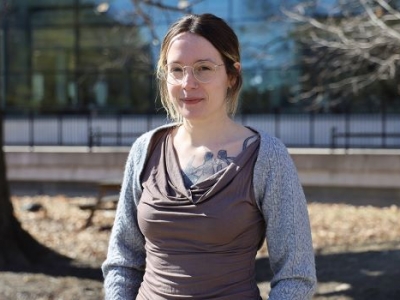The following story was written by Susan Hickman and first published in the April issue of Carleton Now.
 A law and legal studies doctoral student is exploring the lives of women of colour in the Canadian indoor sex industry, a significantly under-researched population whose stories need to be heard, she says.
A law and legal studies doctoral student is exploring the lives of women of colour in the Canadian indoor sex industry, a significantly under-researched population whose stories need to be heard, she says.
Menaka Raguparan, who began her PhD at Carleton in 2011, is specifically talking to women involved in escorting, pornography acting and the massage industry, for example, in an effort to address the problematic silencing of the voices of racialized female sex workers.
“With this research, I hope to shatter assumptions surrounding women of color involved in the indoor sectors of Canada’s sex industry,” she says. “I also hope to represent the voices and lived experiences of an under-represented group of women.”
Recognizing the lack of opportunity for black, Asian or aboriginal women to talk about the stigmatic work they do and why they do it, Raguparan feels honoured to have gained their trust as she interviewed them.
“These women wanted to tell me their stories. They want people to know how difficult and complicated their work is and how offended they feel to be called a victim.”
Originally from Sri Lanka, which she admits is a patriarchal society with strict expectations of women, Raguparan fell into her doctoral work quite accidentally.
“It was in a first-year class during my undergraduate studies (a joint honours in women’s studies and criminology at the University of Ottawa) that I argued we still need feminism, that there’s a whole population of women who are being ignored. We need feminism to liberate these women,” she says.
Her “original” essay caught the eye of a criminology professor who convinced her to continue her studies on the topic.
So, in 2007, impressed with Carleton’s unique law and legal studies program, Raguparan began a master’s, in which she examined the effect of anti-prostitution laws on the daily lives of women involved in the indoor sex industry in Canada.
With so many unanswered questions, she decided to pursue a PhD, expanding the number of women she interviewed and digging deeper into the dynamic and complex nature of the sex industry, particularly with respect to race and class.
“As an advocate for sex workers’ rights, speaking to real women has been a humbling and rewarding experience,” explains Raguparan, who says laws are passed without considering the needs and experiences of sex workers of colour. “For the past seven months, I have been immersed in field work interviewing women from cities across Canada – Toronto, Vancouver, Halifax, Calgary, Saskatoon and Montreal.
“The women really wanted to share their stories and they saw my research as a platform for their voices. It is important to hear the voices of this marginalized group. I feel very privileged to do something as powerful as this work.”
Raguparan admits she had to step far outside of her box as a Sri Lankan woman in order to do this research.
“To be the black sheep in my family and in my culture and to succeed at it, it’s a calling, and so I embrace it.”
Raguparan believes she has nearly two years of work ahead of her to complete her doctoral research, but will be teaching her first course this summer and, in the long-term, hopes to find an academic teaching position, as well as to continue her research on women of color in the indoor sex industry in the United States.
Thursday, April 16, 2015 in Convocation, Grad Student Research, News
Share: Twitter, Facebook




